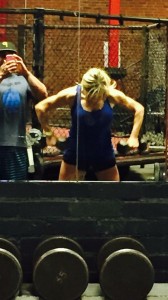Don’t we all want a robust, healthy life? I do! To feel and look our best then, it is important to maximize energy production so we feel naturally energetic all day and preserve and maintain lean muscle mass throughout life.
How does inferior energy production occur? It is the result of… (drumroll) … too much stillness. Inactivity makes you tired. Energy is a renewable resource, so if we don’t get brief explosive intervals and burn calories through other forms of movement and exercise, we have less energy. When we lead an energetic lifestyle, it leads to more energy. Funny how that works. We see this impact with aging and lifespan.
What about muscle? Unfortunately, we (society) have begun to normalize accelerated declines of muscle as a part of aging. It’s NOT normal. The spare tire is a sign of less than stellar metabolic health – not aging. Much of what is considered a result of aging is a byproduct of lifestyle. But, that’s good news because that means we have the power to positively impact our health. We have now learned that lean muscle mass is basically a proxy for good metabolic health.
Bottom line: the more we can focus on improving body composition & increasing energy levels, the better our health AND the more gracefully we will age. (nice side benefit!)
To achieve those two objectives, below are five tips to help:
- Reduce or eliminate junk food (processed foods) from the diet.
- Emphasize nutrient dense foods.
- Move more throughout the day. (Check out my workout tab for Instagram reels offering a variety of 4-minute Tabata style workouts!)
- Perform brief, intense workouts.
- Practice stress management.
Since many people start the new year with weight loss goals, below is an expansion on the first tip above (#1).
Pay attention to oils. I’ve talked about industrial seed oils in my reels (along with a quick & easy balsamic dressing recipe), but here’s why paying attention to these oils matters: consuming processed foods WILL lead to sneaky weight gain. Try making use of Extra Virgin First Pressed Domestic olive oil as a priority (or avocado oil, as runner up). Understand “why” & search for the negative impacts of industrial seed oils and READ ingredient labels to see which products contain these nasty oils. BTW, even your favorite restaurant is using the cheap stuff and most (even “healthy”) salad dressings contain damaging oils. Also of interest is that studies show that up to 40% of calories consumed when dining out come from these industrial seed oils – so it’s difficult to avoid! These poor quality seed oils interfere with your body’s ability to burn stored fat. Often these ugly oils are paired with processed foods (#1). When cooking at home, ditch canola oil and try ghee, coconut butter, avocado oil or olive oil. Set aside some time to check out your pantry and fridge and get rid of processed “foods” with these oils. Sadly, our “Standard American Diet” is truly S.A.D. (Check out the book, “Why We Get Fat” at your local library).
Ditch refined sugars and grains. These are deficient in nutrients and contribute to many health issues by releasing endotoxins from the gut and inhibit energy.
Watch for foods high in natural plant toxins. These high plant toxin foods often contribute to leaky gut. This concept of avoiding or reducing offensive plants is part of the carnivore movement. I’m not advocating a specific diet, but asking you to be aware of how certain foods make you feel. Since plants cannot run away, they possess their own defense mechanisms for protection. Pay attention to how you feel after consuming these foods (stems, seeds, roots, etc.) to determine if they bother you, and id so, consider other options to prepare or cook them differently (soak, sprout, ferment, cook) — or if you avoid them all together. (Check out research and information from Paul Saladino, MD & make up your mind.)
Avoid gluten – it’s is a big offender for many people & can increase the risk of leaky gut.
Last, pay attention to how you feel after you eat. You shouldn’t feel anything, really. Not full, not bloated, not tired, nothing. If you do, that food is likely to be one to avoid. At least for a few months before re-introducing it to your diet.
Listen, we are all in this journey of life together. The more we learn, share and apply positive actions to our lives, the better our lives will be.
Friends, live well, laugh often, and be playful.

Lisa










